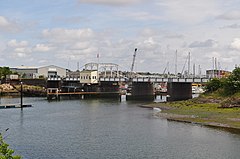Oulton Broad
| Oulton Broad | |
|---|---|
 Oulton Broad Swingbridge |
|
| Oulton Broad shown within Suffolk | |
| Population | 4,619 (Census, 2011) |
| District |
|
| Shire county | |
| Region | |
| Country | England |
| Sovereign state | United Kingdom |
| Post town | LOWESTOFT |
| Postcode district | NR32 |
| Dialling code | 01502 |
| EU Parliament | East of England |
| UK Parliament | |
Oulton Broad refers to both the lake and the suburb and electoral ward of Lowestoft in Suffolk, England, located 2 miles (3.2 km) west of the centre of the town.
Oulton Broad is an expanse of water and marsh which forms part of the network of man-made bodies of water known as The Broads. It is believed to be the remnant of medieval peat cutting. To the east it is linked by a lock to Lake Lothing which passes through the centre of Lowestoft and opens into the North Sea. To the west it is linked by Oulton Dyke to the River Waveney.
The Broad is the most southern area of open water in the Broads system, and is a busy tourist and sporting centre. It is used for a variety of watersports, including powerboat racing, and as the base for boat hire. Facilities include a yacht station and moorings as well as a 'village' of holiday chalets. Nicholas Everitt Park has an extensive water frontage. It is one of the few broads with residential areas adjacent, with houses to the north and flats to the east. The north side of the Broad is one of the most expensive residential areas in Lowestoft, with large detached houses having lake frontage.
While the eastern and north shores of the Broad are built up, the west and south-west are quiet and natural. This part of the lake can be reached on foot by walking through Nicholas Everitt Park and then by public footpaths and field across White Cast Marshes, an important nature conservation area.
Oulton Broad was once a village separate from Lowestoft. Oulton Broad and Oulton Village were conurbated around the late 1950s with the building of the Rock estate. The original Oulton village covered all that land between the site of Oulton Broad South Railway station and the odd number side of what is now Sands Lane with the line of the Lowestoft-Ipswich railway separating Oulton as a whole from Kirkley and Lowestoft. Oulton Village was a somewhat smaller and largely amorphous village extending from the even number side of Sands Lane out across the fields to Somerleyton. The Oulton Broad conurbation eventually merged with Lowestoft with the development in the early 1990s of the new through-road system around Peto way on the north-east side of the village, which brought with it major development of what had remained until then very light residential and grassland. There is now no discernible boundary between Oulton Broad and Lowestoft, save for the presence of the two railway lines.
...
Wikipedia

